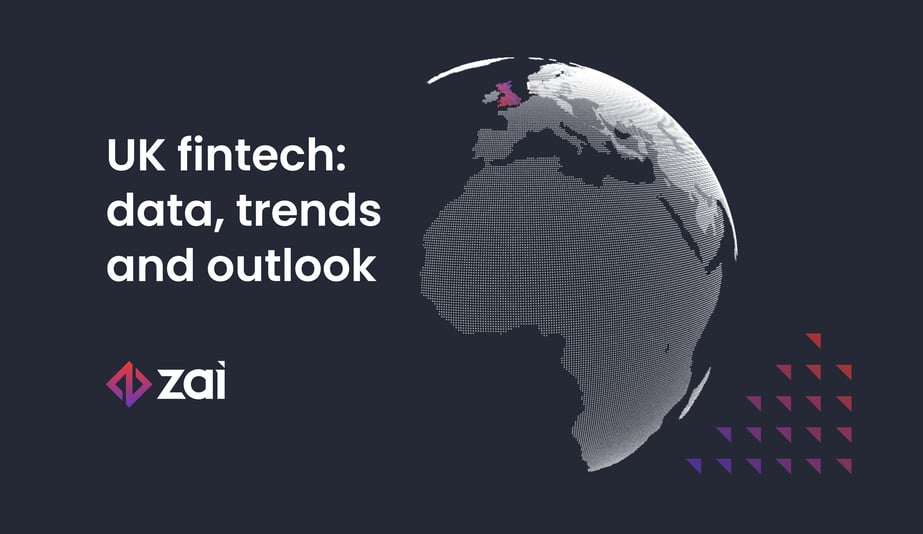After a record year in 2021, with worldwide investment topping $210bn, some experts predicted the fintech bubble was certain to burst in 2022. While global growth has certainly plateaued in recent months, one region is bucking the trend – the UK. In the first half of 2022, investment in the UK’s financial technology sector grew 24% year on year, putting it firmly at the top of Europe’s fintech hubs, and second only to the US in the global market. As we look ahead to 2023, the UK is enviably placed to lead the next phase of development in this multi-billion dollar industry, driven by some exciting local trends.
Environment ripe for growth
With a 71% fintech adoption rate and 350,000 software developers working in London alone, the UK has already proven itself a leader on the global fintech stage.
In the first half of 2022, two of the top five funding deals globally were made by UK businesses (FNZ and checkout.com), and in total the region raked in £7.6bn in funding, more than the rest of Europe combined, and double the amount of Germany (£2bn) and France (£1.9bn).
In comparison, the US market shrank by 10% over the same period, and China fell out of the top 10 countries to host the highest levels of capital invested.
The UK’s regulators have also been doing their part to position the region for further growth. In 2021, Chancellor Rishi Sunak announced plans to make the UK the most open and dynamic place in the world to operate a financial services business.
Following a landmark review by Ron Kalifa into the UK’s role in the global fintech sector, the government pledged a range of regulatory measures to help fintech firms grow, a new task force to explore the potential for a UK central bank digital currency, and even the establishment of an industry-led centre for finance, innovation and technology.
Experts agree that, for the UK to remain at the forefront of the global fintech industry, this momentum must be leveraged, through innovation and collaboration. Here are some of the trends likely to shape the fintech landscape over the coming year.
Intelligent automation
Fintech firms already rely heavily on artificial intelligence (AI) and machine learning (ML) for strategic decision-making, customer insights, understanding consumer purchasing behaviour, and improving the digital transaction experience. However, with the digital transformation spurred on by the global pandemic, intelligent automation will play an even greater role into the future.
For example, AI is helping businesses respond to the demand for improved digital customer service by powering chatbots that not only respond to user questions but replicate banking services previously provided by tellers and call centre staff.
Similarly, AI and ML are taking personalisation to new heights, learning from customer habits and providing tailored financial advice, such as budgeting recommendations based on a user’s income and expenses. They also have applications for reducing the regulatory burden carried by financial advisers, who spend 70% of their time on manual, non-advice work.
Intelligent automation is also central to security management, the need for which has grown exponentially alongside the digitisation of finance and commerce. Thanks to its ability to discern patterns and suspect behaviours, AI can spot fraudulent activities. In fact, identifying new fraud signals is where businesses see one of the highest rates of return on fintech investment.
Key takeaway: Intelligent automation is the fastest growing software segment, with a market size estimated at close to US$600bn. Many believe we’ve only scratched the surface of what the combination of AI and human ingenuity can achieve.
Environmental, Social, Governance (ESG) considerations
Investing that considers social responsibility, as well as financial return is on the rise. Fintech startups are playing a crucial role in helping investors find ethical opportunities and reduce their impact on the environment. This ranges from providing data on companies to green investors, to increasing access to financial services for unbanked and underserved communities, and increasing financial inclusion and environmental awareness through financial education.
Global investor interest in ESG-related fintechs is strong. Mastercard recently issued a report which stated that venture funds deployed approximately 2.5 times more equity into ESG-related fintechs in 2020 relative to what they invested in 2019 (from $700m to $1.8bn).
There's also significant global effort being put towards standardising reporting of climate-related financial information – the Task Force on Climate-Related Disclosures (TFCD) being at the forefront of this activity. As the first G20 country to make TFCD-aligned disclosures mandatory, fintech-enabled reporting and data analysis will be crucial to all UK businesses moving forward.
Key takeaway: The UK is looking to fintech to help realise its sustainable finance goals. The rapid rise in socially responsible investing and the continued need for climate action will drive more innovative fintechs to enter the market to address unmet ESG needs.
Blockchain
The question marks over the sustainability of cryptocurrency aside, the technology that supports crypto – blockchain – is only just beginning to make its presence felt. For example, in 2021, the Treasury and Bank of England created a new taskforce to explore the potential for a UK central bank digital currency (CBDC). At the same time, the University of Glasgow announced the launch of a £1.3m blockchain research centre. Globally, the blockchain technology market is expected to grow to $23bn by 2026.
Blockchain has numerous applications in fintech, particularly in relation to security. Blockchain-based confidential computing can enable business data to remain secure, even if the underlying infrastructure is compromised. Armed with this tool, a company can run any application within a dedicated secure subsystem, protecting both the data and the code used to process it.
Blockchain can also ease compliance friction, such as in the area of money laundering and Know Your Customer (KYC) processes. It can secure ID and KYC functions, even enabling controls to be put in place to restrict access to certain products automatically, based on digital KYC certificates.
Key takeaway: As the UK – and the world – embraces the potential of Web3, there'll be increasing demand for skilled blockchain and smart contract developers. The UK is already positioning itself to meet this demand.
Regtech
In the same way that blockchain is viewed as a critical component to combating cybercrime, regtech is emerging as essential to the provision of financial services in the UK.
The UK’s financial regulators are generally viewed as fintech-friendly, adapting quickly to emerging threats. However, the cost of complying with regulations can become a deterrent to entering (or remaining) in the financial services market. For example, reporting suspicious activity to meet anti-money laundering requirements costs UK financial businesses an average of £186.5m each year (with this cost expected to rise in 2023).
Regtech presents businesses with solutions to reduce these compliance costs through automation and data analysis. Using algorithms and machine learning against big data sets means firms can spot real financial crime. These patterns can then be modelled back through the organisation to look for similar triggers or behaviours.
At a more localised level, the pandemic has encouraged many employees to evaluate the ethics and culture within their own workplaces, leading to the “Great Resignation”. Regtechs may switch their focus from cybersecurity risks to workplace culture and non-financial risk. Technology has a role to play in monitoring and analysing the risks that arise from the remote workforce, as well as modelling risk management strategies for boards and other key decision makers.
Key takeaway: Compliance with financial regulations will remain an economic challenge for businesses, especially those grappling with the financial pressures of rising inflation. Regtech will be critical to reducing these costs, provided data quality and sharing improves alongside fintech development.
Embedded finance
UK customers are embracing embedded finance services, with 60% having used them while shopping online in the past 12 months. Customers who use embedded finance regularly (at least once a month) cite speed, convenience, security, and a superior user-experience as the main reasons for their take-up. But for providers, there are more than just customer service gains to be made.
The use of payment orchestration platforms in e-commerce puts businesses ahead of the game when it comes to cybercrime. Integrated data collection and prevention solutions mean platforms can secure the transaction process while reducing fraudulent activity.
Embedded finance also opens up the world of loyalty rewards, allowing businesses to create truly personalised offers based on their customers’ transaction history and preferences.
Even traditional banks are looking at embedded finance as a way to provide services to existing and new customers. There's an acceptance from these institutions that they no longer have to own the entire customer value chain. Instead, banks are going to become more targeted in their customer acquisition, defining which primary services they will provide while outsourcing other aspects of the relationship to fintech partners.
Key takeaway: Regulatory enhancements have increased public trust in embedded finance. Combined with the rise in e-commerce, customers are starting to expect a fast and secure checkout experience and will take their money elsewhere if it is not available. As we transition to a cashless society, embedded finance will be a must-have for businesses serving the UK’s customers.
Collaboration the key to success
Analysis by Deloitte conducted in conjunction with the Kalifa Review identified that the UK is home to a number of fintech hubs, each with emerging specialisations. Recognising the value of clusters of technology businesses (greater access to talent, investment and industry expertise, for example), Deloitte recommends strengthening the connectivity between the hubs, encouraging national collaboration. This, in turn, will help the UK to continue to remain competitive in the global fintech market.
Collaboration must also occur between firms and regulators. Twelve months after the publication of the Kalifa report, over 70 fintech CEOs and founders collaborated on an open letter to government calling for further action. The letter noted that considerable progress had been made by government, regulators and industry to implement the review’s recommendations. However, the ever-increasing pace of change in global markets and technologies, alongside geopolitical pressures, means there is no time to stand still. The letter argued that “regulators must have the capability and culture in place to allow them to fully embrace innovation while protecting the consumer and financial stability.” Without the input of those consumers, and the businesses who serve them, regulation will be insufficient and potentially stifle innovation.
The outlook for UK fintech
The UK has already achieved a considerable lead in the global fintech market. With all participants in the financial technology community working together to nurture talent, support innovation and level-up fintechs to become global technology giants, the UK has the potential to achieve its goal of global financial technology domination.
Get in touch to find out how Zai's solutions can help your fintech. Download the guide below to discover how payment technology can make your business more agile.


.png?width=211&height=299&name=cover-1%20(2).png)


